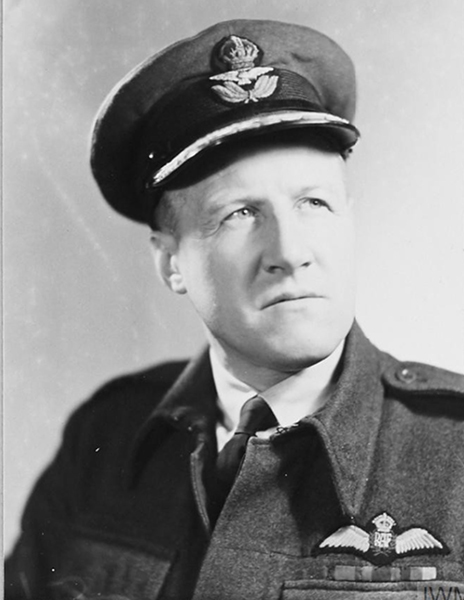Paddon, Brian
- Date of birth:
- August 24th, 1908
- Date of death:
- 1967
- Service number:
- 28097
- Nationality:
- British
Biography
Promotions:
28 June, 1929: Pilot Officer on Probation
28 June, 1930: Pilot Officer
28 December, 1930: Flying Officer
13 September, 1934: permanent commission
? Flight Lieutenant
1 August, 1938: Squadron Leader
18 June, 1942: Wing Commander (temporary)
1 July, 1943: Group Captain (temporary)
1 November, 1947: rank of Group Captain relinquished
1 July, 1948: Group Captain
Do you have more information about this person? Inform us!
- Period:
- Second World War (1939-1945)
- Rank:
- Squadron Leader
- Unit:
- No. 40 Squadron, Royal Air Force
- Awarded on:
- October 6th, 1942
"This officer's aircraft was shot down over Abbeville on the 6th June 1940. The crew were taken prisoners of war and Squadron Leader Paddon, who sustained a sprained ankle, was sent to Germany, arriving at Dulag Luft on the 15th June. He was sent to various other prisoner of war camps, arriving at Stalag XXA, Thorn in February 1941, and ultimately at Oflag IVC, Colditz on the 14th May. He had made ten attempts to escape and after one such attempt at Thorn, had been sentenced to four months close arrest on a charge of insulting behaviour. By the intervention of the U.S. Legation a new trial was ordered and finally a court-martial was fixed for the 11th June at Stalag XXA. He was placed in confinement with other British prisoners in Fort XIII. Here, with the assistance of other British prisoners, he worked out a hurried plan of escape which was to be effected before the trial. Whilst the party of prisoners had been sent to work on a German-occupied Polish farm near Thorn, he was able to slip into a barn where he stripped off his battledress for other clothes which he had been able to secure. Although under guard, he succeeded in walking off as a civilian and made his way into the woods. He was able to cober, on foot, some 50 kilometres from his point of escape and he the boarded a train for Bromberg.
"In the station at Bromberg, there was a military picket who seemed to pay particular attention to soldiers. Owing to the curfew he could not leave the station so he bought a ticket to Gdynia and slept the night in the waiting room. Squadron Leader Paddon reached Gdynia by way of Danzig, but finding that conditions at Gdynia would not be too good for him, he returned to Danzig on the 12th June. Here he boarded a tram for Bergstrasse and spent some time reconnoitring the Swedish ships in the vicinity which were unloading ore. Just before midnight, he crawled down to the quayside through the marshalling yard. He boarded a Swedish ship, the SS Ingolf, and succeeded in obtaining a hiding place thereon although he was told that the ship could not sail for Sweden until the 15th June. He hid in the coal bunker and had to keep himself busy employed trying to remain in the shadow and dodging the falling coal. Before the ship sailed it was subjected to a routine search but Squadron Leader Paddon remained undiscovered.
"Shortly after the ship set sail, he reported himself as an escaped prisoner of war to the Second Mate. The Captain, on subsequently being informed of the position, was extremely troublesome and threatened to turn the ship and head back to Germany. Squadron Leader Paddon made many appeals to the Captain and finally the latter agreed to take him to Sweden if Squadron Leader Paddon would act as though he were of Polish nationality. Although he knew only four words of the language, Squadron Leader Paddon was able to keep up this deception until the ship berthed.
"He was handed over to the Police at Gavle on the 18th June. Here he represented himself as a Polish civilian but was told that as he was a civilian Polish refugee he must return to Germany. He therefore declared his true identity and asked to see the British Consul. He was detained in cells until the 27th June when the British Consul visited him, but was subsequently treated with every kindness and consideration. He remained in Sweden until 6th August and the returned to the United Kingdom."
Sources
- Photo 1: © IWM CH 14584 (CC Attribution Non-Commercial 4.0)
- - https://www.thegazette.co.uk/London/issue/33515/page/4544
- https://www.thegazette.co.uk/London/issue/33628/page/4644
- https://www.thegazette.co.uk/London/issue/34088/page/5907
- https://www.thegazette.co.uk/London/issue/34537/page/4971
- https://www.thegazette.co.uk/London/issue/35725/supplement/4255
- https://www.thegazette.co.uk/London/issue/35725/supplement/4255
- https://www.thegazette.co.uk/London/issue/36092/supplement/3199
- https://www.thegazette.co.uk/London/issue/38125/supplement/5433
- https://www.thegazette.co.uk/London/issue/38125/supplement/5433
- https://www.thegazette.co.uk/London/issue/38344/supplement/3895
- RAF Commands – The meeting place for RAF Researchers



